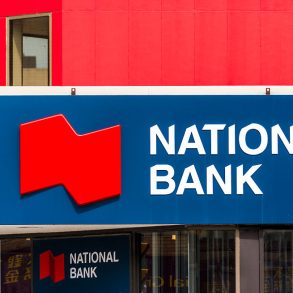Despite interest rates having been elevated for over a year, Canada’s largest bank said the bulk of the impact is yet to be felt with nearly three quarters of its mortgage portfolio coming up for renewal over the next three years.
“To date, less than a third of mortgage clients have seen their payments impacted by higher rates,” RBC’s Chief Risk Officer Graeme Hepworth said during the bank’s fourth-quarter earnings call.
The bank will see 14% ($52.2 billion worth) of its mortgage portfolio come up for renewal in 2024, and another 25% ($89.5 billion) in 2025. Roughly 90% of those are fixed-rate mortgages that currently have an interest rate of between 3.10% and 3.60%, the bank disclosed.
Published rates by the big banks currently range between 5.80% and 7.5% depending on the term and mortgage type.
Delinquencies set to rise, but borrower credit quality remains strong, bank says
“As more people renew at higher rates and more of their income is used to service mortgage debt, we expect delinquencies and losses to increase in the retail portfolio,” Hepworth noted.
Like other lenders, RBC has already seen its mortgage delinquency rate trend upward over the past year. As of the fourth quarter, 0.15% of its mortgage portfolio is currently behind on payments by 90 days or more. That’s up from 0.13% in Q3 and 0.11% a year ago.
Although they remain low by historical standards, delinquency rates are now at or above pre-pandemic levels while “insolvencies have been steadily climbing,” Hepworth added.
However, the bank said it remains confident in the overall credit quality of its borrowers.
“Our mortgage exposure benefits from the strong credit quality of our clients, significant borrower equity and our clients’ capacity to make higher payments,” he said. “As such, higher rates and rising employment are expected to have the largest impact on credit cards and unsecured lines of credit, consistent with the traditional credit cycle.”
RBC sees interest rates easing and stable house prices in 2024
In running its forecasts, RBC acknowledged that there remains “a lot of uncertainty on how credit plays out over 2024,” but that high interest rates and a rising unemployment rate will be the key influencing factors.
RBC sees interest rates starting to pull back by the second half of next year, stable home prices going forward, but it does anticipate the unemployment rate—currently at 5.8%—will continue to rise and likely peak by the middle of next year.
In its more pessimistic scenario, the bank said its forecasts assume a 15% decline in house prices and a steeper rise in the unemployment rate.
“We assume a rate environment where rates persist higher than they are now for a longer period. And we consider a world where unemployment could get up into the mid-7s,” Hepworth said.
Amortization periods coming back down
Continuing a trend seen last quarter, RBC reported a continued decrease in the remaining amortization periods for its residential mortgage portfolio.
In previous quarters, banks that offer fixed-payment variable-rate mortgages, like RBC, TD, BMO and CIBC, had seen the amortization periods for those mortgages lengthen dramatically.
In most cases, however, the mortgage reverts to the original amortization schedule at renewal, which would typically result in a higher monthly payment.
In Q4, RBC saw the percentage of mortgages with a remaining amortization above 35% continue to ease to 22% of its portfolio, down from a peak of 25% in Q2 and down from 23% in Q3.
RBC residential mortgage portfolio by remaining amortization period
| Q4 2022 | Q3 2023 | Q4 2023 | |
| Under 25 years | 57% | 57% | 57% |
| 25-29 years | 16% | 19% | 20% |
| 30-34 years | 2% | 1% | 1% |
| 35+ years | 25% | 23% | 22% |
RBC earnings highlights
Q4 net income (adjusted): $4 billion (+1% Y/Y)
Earnings per share: $2.78
| Q4 2022 | Q3 2023 | Q4 2023 | |
| Residential mortgage portfolio | $352B | $363.2B | $366B |
| HELOC portfolio | $36B | $35B | $34B |
| Percentage of mortgage portfolio uninsured | 69% | 77% | 77% |
| Avg. loan-to-value (LTV) of uninsured book | 45% | 69% | 68% |
| Portfolio mix: percentage with variable rates | 34% | 29% | 27% |
| Average remaining amortization | 20 yrs | 24 yrs | 25 yrs |
| 90+ days past due | 0.11% | 0.13% | 0.15% |
| Mortgage portfolio gross impaired loans | 0.10% | 0.11% | 0.13% |
| Canadian banking net interest margin (NIM) | 2.42% | 2.68% | 2.71% |
| Provisions for credit losses | $381M | $616M | $720M |
Conference Call
- Mortgage volume moderated to 4.1% compared to last year.
- RBC ended the year with a CET1 ratio of 14.5%, up almost 200 basis points from last year and 40 bps from Q3.
- “We expect Canadian mortgage growth will continue to moderate to the low to mid-single digits as immigration driven demand more than offset the impact of higher interest rates on the cost of capital,” said President and CEO Dave McKay.
- “Our partnership with ICICI Bank Canada has created an attractive banking experience for newcomers, attracting 30,000 new clients this year alone,” McKay noted. “These clients come with new deposits which provide a stable source of funding, are also an important factor in clients consolidating their relationship with RBC at a rate that is 50% higher than average.”
- On the HSBC acquisition deal:
- Commenting on RBC’s proposed $13.5-billion acquisition of HSBC Canada, which recently faced some political opposition, McKay said “we certainly feel very good about the overall process, and we have to respect the overall process in all steps. We have a strong approval from the Competition Bureau who recognizes that there remains a very strong competition in the Canadian marketplace and in all the markets where HSBC operated.”
- He also spoke to the “enormous benefit to Canadians” the deal would have if approved by way of increased taxes and increased dividends in the country. “All parties in the approval process understand the benefits to the country of tax revenue increases of dividend increases of investment in Canada and incremental investment in Canada, the benefits to employees and to clients,” he said.
- “It would be a very bad signal to the floor and investors to not move forward with this as we have to attract capital into this country,” McKay added. “We are confident in the overall outcome of this transaction. So we’re waiting for approval and we have to respect that process.”
Source: RBC Q4 conference call
Note: Transcripts are provided as-is from the companies and/or third-party sources, and their accuracy cannot be 100% assured.
Featured image







